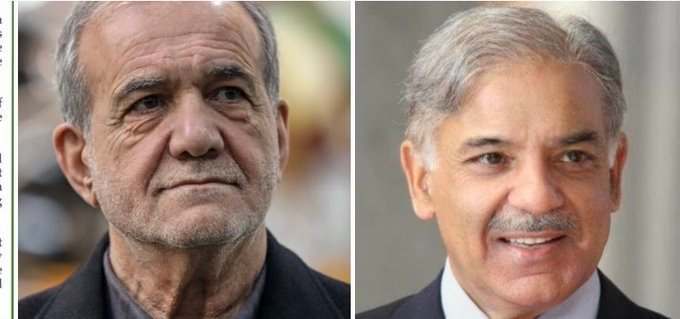Islamabad (TDI): Prime Minister Shehbaz Sharif on Saturday held a telephone conversation with Iranian President Dr Masoud Pezeshkian, during which he strongly condemned the recent US military strikes targeting nuclear facilities inside Iran. The call came amid rising regional tensions following Israeli aggression and a sharp escalation involving the United States.
According to an official statement, the prime minister expressed deep concern over the attacks, calling them a blatant violation of international law and a direct threat to regional peace. He reiterated that Iran has the inherent right to self-defence under the United Nations Charter and extended Pakistan’s full solidarity with the Iranian government and people during this critical time.
President Pezeshkian thanked Pakistan for its principled position and reaffirmed Iran’s commitment to regional stability, while also warning that Tehran would not tolerate continued violations of its sovereignty. Both leaders underscored the urgency of diplomatic engagement and warned against the consequences of further escalation.
This was the second conversation between the two leaders in less than ten days, reflecting Islamabad’s heightened diplomatic outreach as the conflict deepens.
Earlier, the Ministry of Foreign Affairs (MOFA) had issued a strong condemnation of the US strikes, which followed a series of Israeli attacks on Iranian targets.
🔊PR No.1️⃣8️⃣2️⃣/2️⃣0️⃣2️⃣5️⃣
Pakistan Condemns the US Attacks on the Nuclear Facilities of the Islamic Republic of Iran.
🔗⬇️https://t.co/2qpo27WzVQ pic.twitter.com/ugtFomQ5HO
— Ministry of Foreign Affairs – Pakistan (@ForeignOfficePk) June 22, 2025
The MOFA statement warned of “severely damaging implications” if hostilities are not halted, and stressed the importance of respecting international humanitarian law and civilian safety.
The latest developments come in the aftermath of US airstrikes on Iran’s Arak nuclear facility and other sensitive installations, conducted reportedly after Iranian missile attacks struck southern Israel, including near a military-linked site.
The escalation has prompted fears of a broader regional war, with Washington now actively involved in military operations against Tehran. Pakistan has called for immediate de-escalation, restraint from all sides, and adherence to dialogue as the only viable path forward.
It is also important to note that Prime Minister Shahbaz was in Tehran on May 25th for a two days visit to meet with the leadership in Tehran.
Honoured to call on His Eminence Ayatollah Sayyed Ali Khamenei, Supreme Leader of Iran. I sought his views especially with regards to the current challenges faced by Muslim Ummah. We also exchanged views on bilateral and regional issues of mutual interests. I thanked him for… pic.twitter.com/smmUBJER89
— Shehbaz Sharif (@CMShehbaz) May 26, 2025
The conversation followed the prime minister’s recent high-level visit to Iran on May 27, during which he met with both President Pezeshkian and Supreme Leader Ayatollah Khamenei, accompanied by a senior Pakistani delegation including the foreign minister, army chief, and other key officials.
During today’s call, Prime Minister Sharif reaffirmed Pakistan’s unwavering solidarity with Iran, condemned the U.S. strikes, acknowledged Iran’s right to self-defense under the UN Charter, and reiterated Pakistan’s call for an immediate ceasefire and the pursuit of diplomacy. During the visit Prime Minister also met the Supreme Leader of Iran.
It is important to note that this call between the two took place as the region braces for further instability as in a dramatic escalation of the Middle East crisis, the United States launched precision airstrikes targeting key Iranian nuclear facilities, including the Arak heavy water reactor and suspected missile development sites.
The strikes came shortly after Iran launched a series of retaliatory ballistic missiles into southern and central Israel, one of which reportedly caused significant damage to a hospital near a military-linked facility.
The U.S. action, carried out with advanced stealth bombers and supported by naval assets in the region, marks a significant entry into the conflict, with Washington citing Tehran’s accelerated nuclear activities and support for regional proxies as immediate threats.
The Pentagon has confirmed limited objectives aimed at degrading Iran’s nuclear infrastructure, while Iranian state media have condemned the move as a flagrant violation of sovereignty and international law.
The strikes risk triggering a broader regional conflict, as Iranian military forces shift into wartime posture, proxy groups activate across multiple theatres, and global powers assess their positions in an increasingly volatile confrontation.
The Diplomatic Insight is a digital and print magazine focusing on diplomacy, defense, and development publishing since 2009.



